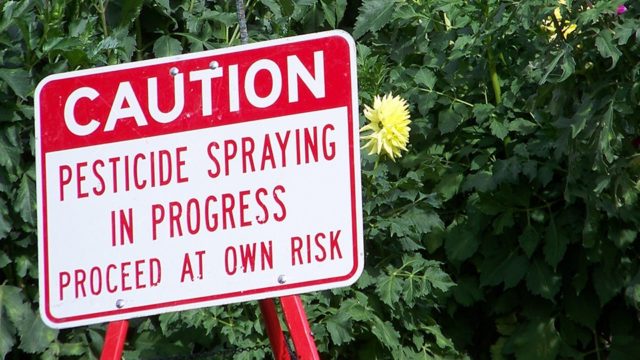Toxic chemical is banned in EU and US and is known to cause brain damage in children
Toronto, Ont./ Traditional territories of several First Nations including the Williams Treaties First Nations, Huron-Wendat, the Anishnaabeg, Haudenosaunee, Chippewas, and the Mississaugas of the Credit First Nation — Health groups are in Federal Court this week to challenge Health Canada’s decision to allow a three-year phase-out of chlorpyrifos. Chlorpyrifos is a dangerous pesticide that causes brain damage in children, among other health risks.
Ecojustice filed the lawsuit early last year against Health Canada’s Pest Management Regulatory Agency (PMRA) on behalf of Safe Food Matters and Prevent Cancer Now. The groups say that the PMRA’s phase-out decision for chlorpyrifos underscores broader systemic issues with how the regulatory body makes decisions about harmful chemicals that impact the health of Canadians.
Decision lacks transparency and ignores science
Documents obtained by Ecojustice reveal that the PMRA repeatedly ignored warnings from its own scientists about the health risks posed by chlorpyrifos, stalling a review of the pesticide for close to 20 years and continually disregarding findings of potential contamination of drinking water. These alarming health concerns were never shared publicly.
“The PMRA’s mandate is to protect human health and the environment by minimizing the risks posed by pest control products. Despite this, the Agency made a deliberate decision not to update its risk assessment for chlorpyrifos for decades despite mounting evidence of the harms it poses to the health of people in Canada,” said Meg Sears, chairperson, Prevent Cancer Now.
“Chlorpyrifos is one of dozens of similar insecticides that are toxic to the nervous system; these pesticides have slowly been banned one-at-a-time by the PMRA. This trickle-approach means generations of Canadians are still at risk of exposure to toxic chemicals in our food sources. Health Canada must take proactive, urgent action on groups of chemicals that harm child development or contribute to cancers.”
Canada lagging behind other countries
In 2019, the European Food Safety Authority found there is no safe level of exposure to chlorpyrifos, leading to an outright ban of chlorpyrifos on food products in the European Union in 2020 and tighter limits on food imports with chlorpyrifos residues (although chlorpyrifos continues to be exported from the EU). The US banned most uses of this toxic chemical in 2021.
“The PMRA found a technical excuse to ban the chemical once it finally looked around and saw that the US and Europe were taking such steps. It is shameful that our regulator can’t make its own, independent, responsible decisions,” said Mary Lou McDonald, president, Safe Food Matters Inc.
“Just a few months ago at the Convention on Biodiversity (COP15) in Montreal, the federal government committed to a 50 per cent reduction in risks posed by pesticides by 2030. Achieving this ambitious target will require a U-turn in pesticide registrations and acceleration of phase-outs. The chlorpyrifos management pathway is the road to failure.”
Decision prioritizes industry interests over human health
Rather than safely disposing of remaining stocks of chlorpyrifos in Canada, the PMRA is allowing the dangerous chemical to continue to be spread on crops until the end of 2023. This protects pesticide companies from needing to buy back unusable products and puts the health of people in Canada at risk.
“The PMRA has a disturbing history and pattern of contradicting its internal scientific assessments and cherry-picking evidence to support its conclusions. These conclusions are often favourable to industry,” said Laura Bowman, lawyer, Ecojustice. “The PMRA has a mandate to proactively protect the health of Canadians. Instead, the agency allows banned pesticides to be used for three more years to ‘use up’ existing stocks instead of protecting the public and workers.”
Migrant workers rights group intervenes in case
Justice for Migrant workers has intervened in this case through their own counsel to ensure that the protection of vulnerable workers exposed to high levels of pesticides, who are forgotten by the PMRA, are not silenced.
The groups involved in this case say a win in court could set a precedent about how Health Canada assesses and manages the risks that hazardous pesticides pose to the health and wellbeing of Canadians.
The hearing will take place from April 12-14, 2023, at Federal Court in Toronto, located at 180 Queen St W. Media and members of the public can attend in person or register online for virtual access.




